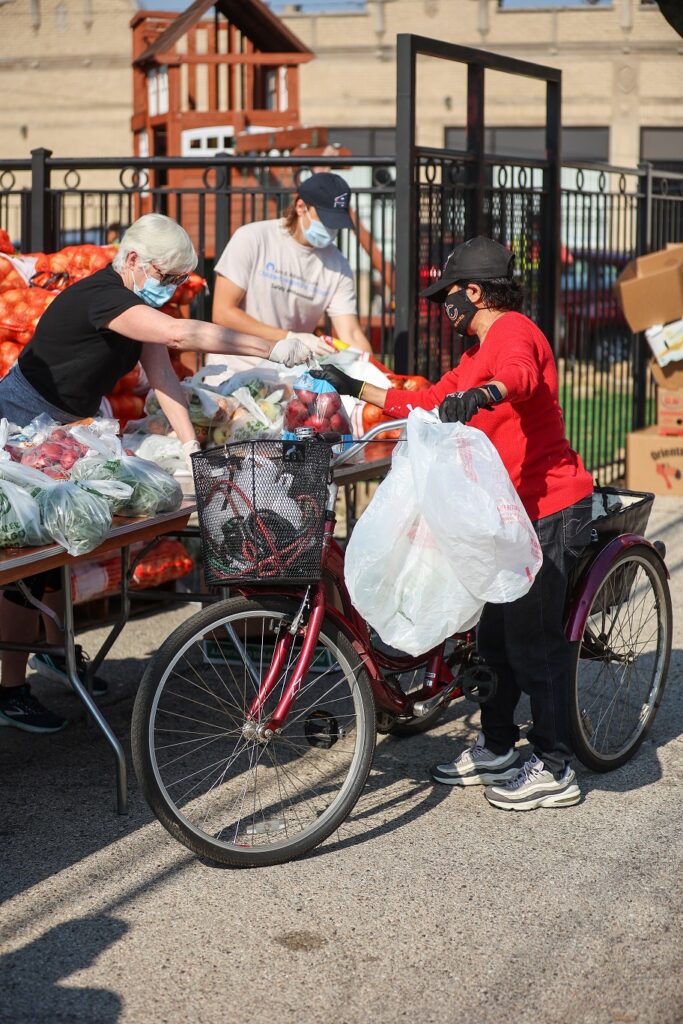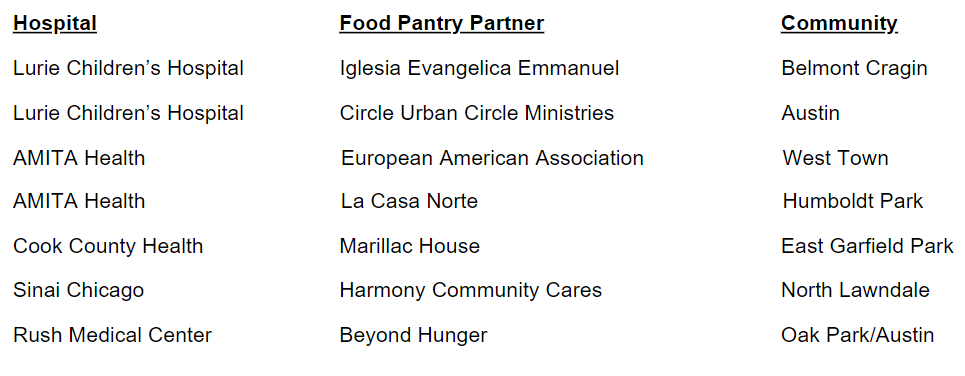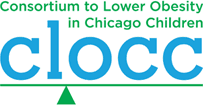By Jennifer Marcisin, MPH, RDN, LDN, Community Food Access Manager
A nutritious diet is vital for chronic disease prevention and can help to reduce the incidence of leading causes of death and disability such as heart disease, cancer, and diabetes. Eating healthy can be challenging if healthy foods are not accessible, available, or affordable. Improving food access throughout Chicago and Cook County has been a key strategy for CLOCC since our inception.
In CLOCC’s early years, we developed an initiative in West Town/Humboldt Park with the Puerto Rican Cultural Center and the Sinai Urban Health Institute called Community Organizing for Obesity Prevention in Humboldt Park (CO-OP HP). One of the primary goals for CO-OP HP was to enhance a food environment in which residents could easily find diverse, affordable, fresh produce. The Greater Chicago Food Depository’s “Produce Mobile” helped us deliver free produce on a regular basis. Growing Power’s “Market Basket” helped establish a produce purchasing program in which residents could purchase and pick up bags of produce weekly at PRCC. The PRCC moved the Market Basket pick-up to a local corner store and developed an arrangement with a local produce market to demonstrate the demand for fresh produce to local retailers. This was the early iteration of what became CLOCC’s Healthy Corner Store Initiative.
We were able to replicate this strategy with the federally funded Healthy Places initiative, part of the US Centers for Disease Control and Prevention’s Communities Putting Prevention to Work (CPPW) program (2012-2014). CLOCC received $8.5M over two years on behalf of the City of Chicago and created a community intervention strategy that included Healthy Corner Stores. These funds enabled us to support partners in Humboldt Park, Englewood/West Englewood, and South Chicago to engage ~30 neighborhood stores and enhance the availability of fruits and vegetables in communities where childhood obesity rates were high and the local food retail environments were struggling.
The CDC replaced CPPW with a new initiative, Partnerships to Improve Community Health (PICH; 2014-17). CLOCC received PICH funding from the Cook County Department of Public Health to support corner store work in the west and south suburbs of Cook County, picking up on the suburban Healthy Corner Store initiative led by the Public Health Institute of Metropolitan Chicago in Cook County’s CPPW program – Healthy HotSpots. The Healthy Hotspot initiative increased availability of healthy foods in 25 corner stores. Through Healthy HotSpots community-based organizations in Blue Island, Cicero, Maywood, Harvey, Chicago Heights, Ford Heights, and Riverdale helped us recruit corner stores, assess healthy food availability, and work with owners to increase the number of healthy foods available and promote the items through in-store marketing materials, food tasting events, and a digital and social media marketing campaign, “Healthy Choices are Just Around the Corner.” In partnership with The Food Trust, we developed the Healthy Corner Store Toolkit for community-based organizations, as a how to guide for Healthy Corner Store Work. (Contact info@clocc.net for details).
In addition to leading initiatives to support healthy food retail across Chicagoland, CLOCC developed a series of food access workshops to help build capacity among CLOCC Network partners to expand nutritious food access in their communities. In these workshops, convened from 2014-16, community organizations that were leading food access initiatives in the neighborhoods they served shared their models with other organizations interested in adapting the strategies. Workshops covered topics such as healthy corner stores and strategies for healthy food supply, healthy emergency food system strategies, and farmers’ market development and management.

In 2018, Lurie Children’s Hospital became one of the founding anchor institutions in West Side United (WSU). WSU is a collaborative of healthcare institutions and community-based organizations aiming to reduce the life expectancy gap between the Loop and West Side neighborhoods of Chicago by 50% by 2030. As a part of the collaborative, CLOCC’s team has played a key role in the WSU Food Strategy Working Group, which supports WSU’s neighborhood and physical environment impact areas. The group focuses on piloting new food initiatives, such as a Fruit and Vegetable Voucher Program (FVVP) and the Food Pantry Support initiative. The FVVP is currently piloting in Austin with distributions at three WSU hospital clinics and through nutrition programs hosted by Bethel New Life. The program provides participants with vouchers that they can redeem for half-off their produce purchases at Forty Acres Fresh Market or Top Box Foods.
As the WSU partner hospitals expand food insecurity screenings, the Working Group aims to connect more patients to food resources in their neighborhoods. The emergency food system and local food pantries are a critical resource for free, healthy food at the neighborhood level. Five of the WSU hospital partners have developed relationships with at least one West Side food pantry each to provide capacity-building support. The hospital partners offer the pantries assistance based on the individual pantry’s needs, including financial assistance, volunteer recruitment, food donations, and mental health screenings. The partnership ensures that West Side residents who seek healthcare at WSU hospitals are referred to a network of pantries that provide a variety of healthy food options and wrap around services. The Food Pantry Support initiative group also strives to provide nutrition education options at each pantry and has developed a nutrition education toolkit with resources for food pantries. The participating pantries and their hospital partners are:

Through the National Alliance for Nutrition and Activity, convened by the Center for Science in the Public Interest (CSPI, CLOCC supported strategies to enhance school food programs, increase healthy food marketing, and protect the Supplemental Nutrition Assistance Program (SNAP). Through our membership in the Illinois Alliance to Prevent Obesity we have helped establish the Healthy Local Food Incentives Fund and advocated for improved nutrition requirements in licensed childcare centers and group homes across the state. We are proud to be a founding member of the City of Chicago’s Food Equity Council, continuing our efforts to ensure equitable access to nutritious food for all Chicagoans. The CLOCC network will continue to be a champion for the policies and programs to increase healthy food access at the local, City, State, and Federal levels.

